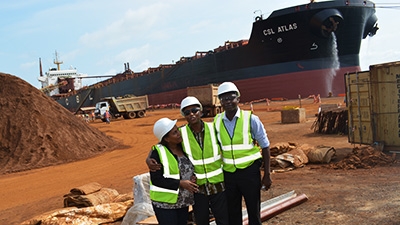“The civil war caused the poor to get poorer because people had disagreements about who should take what profits from mining,” said Cecilia Danuweli, Chair of ¨Publish What You Pay¨ International Coalition in Liberia. “Now we understand better how the people can benefit from natural resource exploitation and we think change is coming to Liberia.”
Representatives from Liberia, Tanzania and Ethiopia met in Monrovia November 17-23, 2013, to share experiences on implementing EITI, which requires disclosure of revenue payments and receipts from the extractive industries. Liberia and Tanzania are both EITI-compliant countries, while Ethiopia is applying for candidacy. With diverse stakeholders from government, civil society and the private sector at the meeting, the exchange was informative for all sides.
Representatives from Liberia shared their success story about implementation of an EITI legal framework. Its binding requirements helped boost the volume of revenues disclosed from both the private sector and government agencies, by 59% and 80% respectively.
Tanzania is acting beyond these exchanges. A draft EITI law was submitted to the country’s cabinet in early November 2013.
¨The legal mandate to comply with EITI implementation adds more accountability as resource-rich countries cannot always rely on the ‘goodwill’ of companies,¨ said Sam Tokpah, national coordinator of Liberia EITI, or LEITI. LEITI implementation, he said, has helped Liberia to consolidate peace by sharing information and diminishing misconceptions.
Since EITI implementation, the debate over extractives in Liberia has shifted from ‘perceptions of collusion between companies and government officials’ to ‘how is the government using the revenues?’ Data show that year after year, the extractive industries’ contribution to the economy has increased both in Liberia and Tanzania.
Delegations from Ethiopia and Tanzania were also interested in Liberia’s inclusion of the forestry industry in the EITI framework. Revenues from forestry extraction often eluded Liberian government coffers in the past. But since its inclusion in EITI, the industry helps to maintain the rule of law in the logging regions and reduce illegal logging and excess harvesting.
On the last day of the Monrovia meeting, the group visited a community near the Port of Buchanan, from which most of Liberia’s iron ore is exported. They heard the locals’ opinions of EITI there, and were impressed by the informed questions on the types of resources being exported, production numbers and the accuracy of sector data published. After the community meeting, the delegates visited the Arcelor Mittal Mining Company’s iron ore shipping dock to hear the company’s description of a large-scale mining operation.
“Communities know how much our company is contributing to the Tanzanian economy,” said Godvictor Ibrahim of the Anglo-Gold Ashanti mine in Tanzania. “Due to EITI, our relationships with communities have improved.”
Ato Addisu Arega, Ethiopian State Minister for Planning and Policy Implementation, said lessons learned at the conference will enhance Ethiopia's quest to become an EITI candidate. Since the study tour, the Ministry of Mines in Ethiopia is reorganizing its mining cadaster office to strengthen the transparency of the licensing process and increase its revenue collection capabilities.
Inguna Dobraja, World Bank Country Manager in Liberia, echoed these sentiments and called for more work on this front. “Liberia has made some great progress, but greater transparency and accountability is needed to ensure effective planning and management of the country’s natural wealth,” she said. “The World Bank will continue to bring together stakeholders in an effort to ensure that natural resources exploitation contributes to poverty reduction and shared prosperity.”


